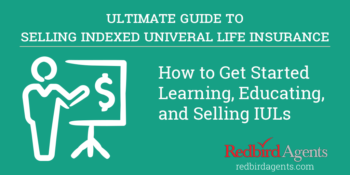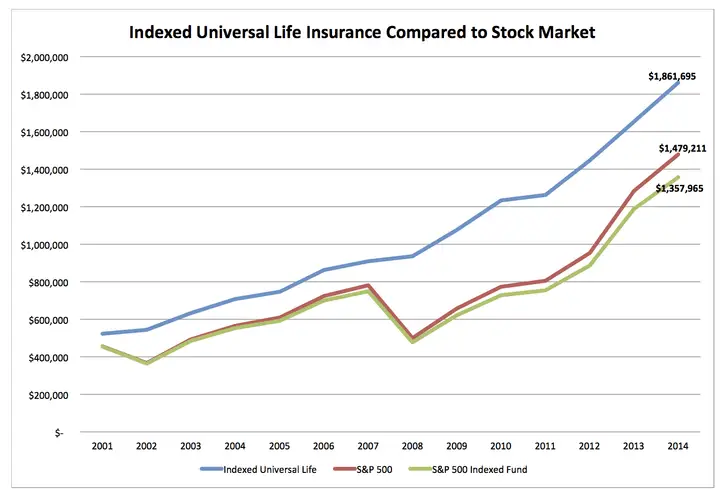All Categories
Featured
Table of Contents
1), typically in an effort to defeat their group averages. This is a straw male argument, and one IUL individuals like to make. Do they compare the IUL to something like the Lead Total Amount Securities Market Fund Admiral Show no lots, an expense proportion (EMERGENCY ROOM) of 5 basis points, a turnover ratio of 4.3%, and a phenomenal tax-efficient record of circulations? No, they contrast it to some awful proactively taken care of fund with an 8% load, a 2% ER, an 80% turnover proportion, and a dreadful document of short-term capital gain distributions.
Common funds often make yearly taxable distributions to fund owners, also when the worth of their fund has actually dropped in worth. Shared funds not just require earnings coverage (and the resulting yearly taxes) when the shared fund is rising in worth, but can likewise impose earnings tax obligations in a year when the fund has actually dropped in value.
That's not just how shared funds work. You can tax-manage the fund, gathering losses and gains in order to reduce taxed distributions to the capitalists, however that isn't in some way mosting likely to change the reported return of the fund. Only Bernie Madoff kinds can do that. IULs avoid myriad tax catches. The possession of common funds might call for the common fund proprietor to pay approximated tax obligations.

IULs are very easy to position to ensure that, at the owner's fatality, the recipient is exempt to either income or estate tax obligations. The same tax obligation decrease methods do not function almost too with common funds. There are countless, usually pricey, tax obligation traps related to the moment purchasing and marketing of shared fund shares, traps that do not relate to indexed life insurance policy.
Opportunities aren't very high that you're mosting likely to go through the AMT because of your mutual fund circulations if you aren't without them. The remainder of this one is half-truths at finest. While it is true that there is no income tax due to your beneficiaries when they acquire the proceeds of your IUL plan, it is additionally true that there is no income tax obligation due to your beneficiaries when they acquire a shared fund in a taxed account from you.
The Cash Value In An Indexed Life Insurance Policy
There are better ways to prevent estate tax problems than purchasing financial investments with low returns. Common funds may trigger income taxes of Social Protection benefits.

The development within the IUL is tax-deferred and might be taken as tax obligation free income using financings. The policy owner (vs. the mutual fund manager) is in control of his or her reportable earnings, therefore allowing them to reduce and even eliminate the taxes of their Social Security benefits. This is excellent.
Below's another very little issue. It holds true if you acquire a mutual fund for state $10 per share simply prior to the circulation date, and it distributes a $0.50 circulation, you are then going to owe taxes (probably 7-10 cents per share) although that you have not yet had any type of gains.
In the end, it's actually concerning the after-tax return, not exactly how much you pay in taxes. You are mosting likely to pay more in taxes by utilizing a taxed account than if you buy life insurance policy. You're also most likely going to have even more money after paying those taxes. The record-keeping requirements for owning common funds are significantly extra intricate.
With an IUL, one's documents are kept by the insurance policy business, duplicates of annual statements are sent by mail to the proprietor, and circulations (if any type of) are amounted to and reported at year end. This is also sort of silly. Naturally you ought to keep your tax obligation records in instance of an audit.
Whole Life Vs Iul
All you have to do is shove the paper into your tax folder when it shows up in the mail. Rarely a reason to purchase life insurance policy. It's like this man has actually never purchased a taxed account or something. Mutual funds are generally component of a decedent's probated estate.
Additionally, they go through the delays and expenditures of probate. The profits of the IUL policy, on the other hand, is always a non-probate distribution that passes outside of probate directly to one's called recipients, and is consequently not subject to one's posthumous creditors, undesirable public disclosure, or similar hold-ups and costs.
We covered this one under # 7, but simply to wrap up, if you have a taxable common fund account, you have to place it in a revocable trust (or even less complicated, use the Transfer on Death classification) in order to stay clear of probate. Medicaid disqualification and life time revenue. An IUL can offer their proprietors with a stream of revenue for their whole life time, regardless of just how long they live.

This is beneficial when arranging one's events, and transforming assets to revenue prior to an assisted living home confinement. Mutual funds can not be transformed in a comparable fashion, and are practically constantly taken into consideration countable Medicaid properties. This is another foolish one advocating that poor individuals (you know, the ones who need Medicaid, a federal government program for the bad, to spend for their nursing home) must use IUL rather than common funds.
Universal Guarantee Life Insurance
And life insurance policy looks terrible when contrasted rather versus a pension. Second, individuals that have money to buy IUL over and beyond their pension are going to have to be terrible at taking care of cash in order to ever qualify for Medicaid to pay for their retirement home costs.
Chronic and incurable disease cyclist. All policies will certainly enable an owner's easy access to cash from their policy, often forgoing any abandonment charges when such individuals suffer a severe disease, need at-home care, or end up being constrained to an assisted living facility. Mutual funds do not offer a similar waiver when contingent deferred sales charges still relate to a shared fund account whose owner needs to sell some shares to money the costs of such a remain.
Index Linked Term Insurance
Yet you reach pay even more for that benefit (biker) with an insurance plan. What a good deal! Indexed global life insurance policy supplies survivor benefit to the recipients of the IUL owners, and neither the owner nor the recipient can ever shed money because of a down market. Shared funds provide no such assurances or survivor benefit of any type of kind.
I certainly don't require one after I get to financial freedom. Do I desire one? On standard, a purchaser of life insurance coverage pays for the real cost of the life insurance coverage benefit, plus the prices of the plan, plus the profits of the insurance coverage firm.
How To Get Out Of Universal Life Insurance
I'm not totally sure why Mr. Morais tossed in the entire "you can't lose money" again right here as it was covered rather well in # 1. He just intended to duplicate the most effective selling factor for these things I expect. Once again, you do not lose small bucks, however you can shed genuine dollars, along with face severe opportunity expense as a result of reduced returns.
:max_bytes(150000):strip_icc()/dotdash-comparing-iul-insurance-iras-and-401ks-Final-71f14693e37d4fb1b0736112179802b5.jpg)
An indexed global life insurance policy plan owner might exchange their policy for a totally different policy without causing income tax obligations. A common fund owner can not move funds from one common fund business to another without marketing his shares at the former (hence setting off a taxable event), and repurchasing brand-new shares at the last, commonly based on sales costs at both.
While it holds true that you can exchange one insurance plan for one more, the reason that people do this is that the very first one is such a dreadful plan that also after purchasing a brand-new one and experiencing the very early, adverse return years, you'll still appear in advance. If they were marketed the appropriate plan the very first time, they shouldn't have any type of wish to ever trade it and undergo the early, unfavorable return years again.
Table of Contents
Latest Posts
Ffiul Insurance
Flexible Premium Life
Iul Sales
More
Latest Posts
Ffiul Insurance
Flexible Premium Life
Iul Sales